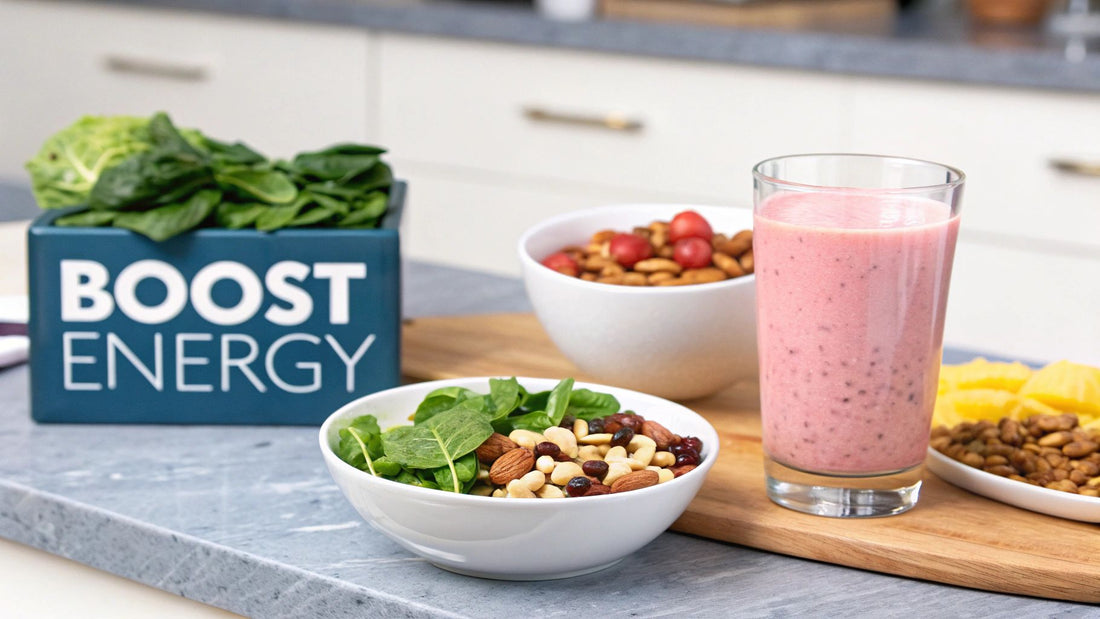
Fatigue During Period and How to Boost Energy
Share
Feeling completely drained during your period isn't just in your head—it's a real, and very common, experience. This overwhelming fatigue during your period is your body's response to a perfect storm of hormonal shifts, a drop in iron from blood loss, and a natural inflammatory process.
Getting to grips with what’s actually happening inside your body is the first step toward managing that monthly exhaustion and getting back on your feet.
Why You Feel So Tired During Your Period
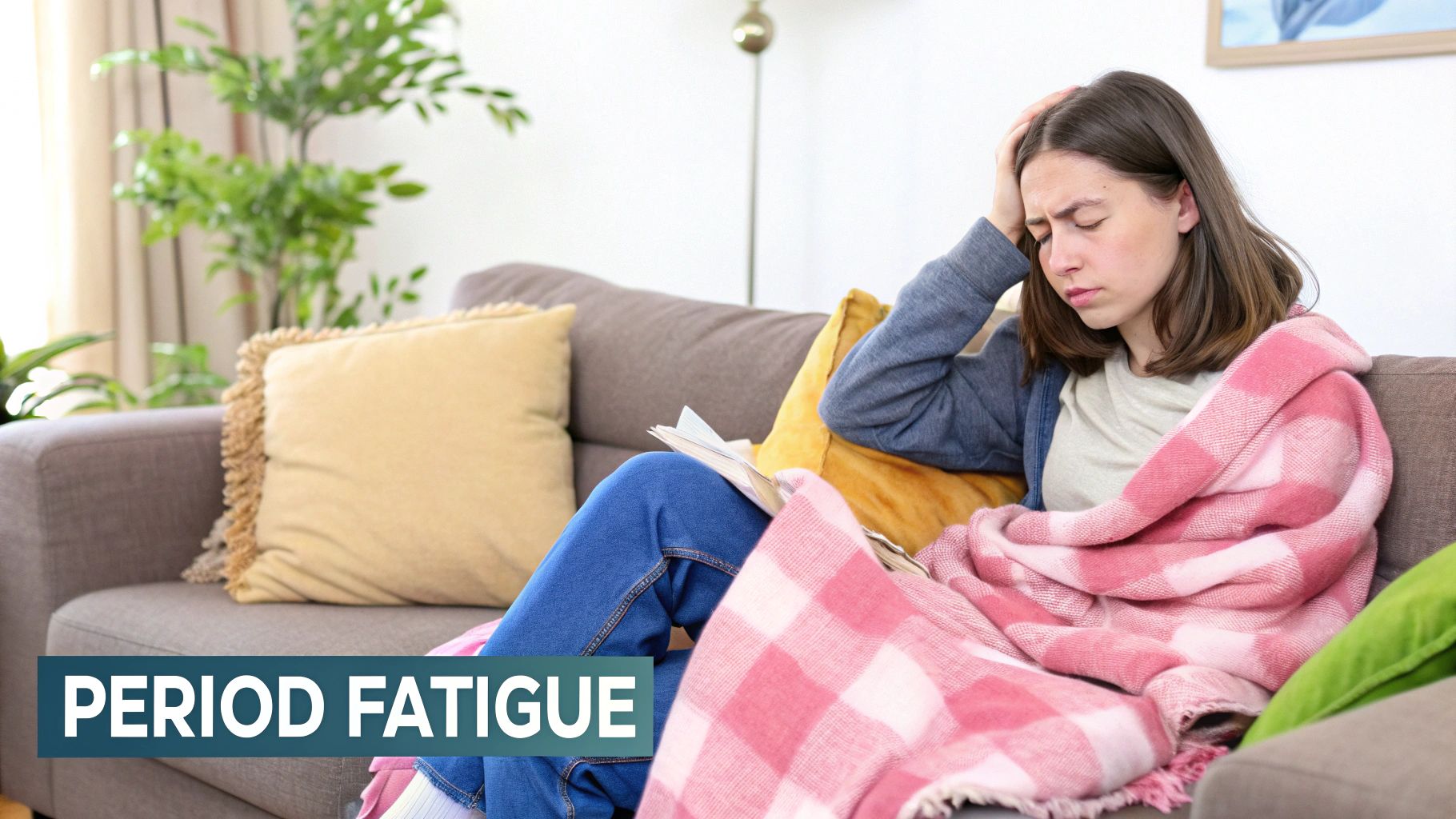
If you’ve ever felt like your energy has been completely unplugged during your period, you are far from alone. This isn't just a vague feeling; it's a physiological response to some seriously complex processes going on behind the scenes. Think of your body as a phone running a major software update—it's doing crucial work, so it’s only natural for the battery to drain much faster than usual.
For many wāhine across New Zealand, this is just a regular part of the monthly cycle. In fact, it’s one of the most common complaints linked to menstruation. A recent nationwide survey on menstrual health among young women in Aotearoa found that a staggering 78.1% of respondents regularly deal with fatigue or exhaustion.
That number really drives home how widespread this is. It validates your experience and shows just how much of an impact it has. You can learn more about the study's findings on menstrual health.
The Main Culprits Behind Period Fatigue
So, what’s really behind this energy crash? It’s not just one thing, but a few biological factors teaming up to create the perfect storm for exhaustion, leaving you feeling sluggish and just plain off.
Here are the key reasons you might feel so wiped out:
- Hormonal Fluctuations: Right before your period starts, your body's key hormones, oestrogen and progesterone, take a nosedive. This sharp drop acts like a dimmer switch on your energy, messing with everything from your mood to how well you sleep.
- Iron Depletion: When you lose blood, you lose iron. Iron is absolutely essential for making haemoglobin, the protein in your red blood cells that ferries oxygen around your body to create energy. Even a small dip can make a huge difference to your stamina.
- Inflammation: The process of shedding your uterine lining releases compounds called prostaglandins. They’re necessary to trigger the cramps that help with menstruation, but they also promote low-grade inflammation throughout the body, which contributes to that generalised achy, tired feeling.
To put it simply, several of your body's systems are working overtime. Let's break it down in a quick-glance table.
Key Causes of Period Fatigue at a Glance
| Factor | How It Contributes to Fatigue |
|---|---|
| Hormonal Dips | Oestrogen and progesterone plummet, affecting mood, sleep, and energy regulation. |
| Iron Loss | Blood loss reduces iron levels, which are vital for oxygen transport and energy production. |
| Inflammation | Prostaglandins cause cramping and systemic inflammation, making you feel achy and drained. |
Each of these factors plays a significant role, and together, they can make even simple daily tasks feel like climbing a mountain.
Understanding why you feel this way is the first step toward doing something about it. When you recognise the biological drivers behind your fatigue, you can start exploring strategies that work with your body—not against it—to reclaim your energy.
The Monthly Hormonal Energy Rollercoaster
To really get why you feel so wiped out during your period, we need to look at the powerful chemical messengers running the show—your hormones. Think of your menstrual cycle as a finely tuned orchestra, with oestrogen and progesterone as the lead conductors. Throughout the month, their levels rise and fall, all in an effort to prepare your body for a potential pregnancy.
But when pregnancy doesn't happen, their levels don’t just dip; they plummet. This sharp drop right before your period is the main culprit behind that classic energy crash. It’s like someone suddenly yanked the power cord on your body's energy and mood regulators, leaving you feeling flat, irritable, and completely drained.
This sudden hormonal shift has a direct impact on your brain chemistry. Oestrogen, for instance, helps boost serotonin, one of your brain's feel-good chemicals that also plays a big part in your energy levels. So, when oestrogen falls, serotonin can dip too, contributing to both a low mood and that profound sense of tiredness. You can dive deeper into how this all works by exploring the four phases of the menstrual cycle in our detailed guide.
Meet the Prostaglandins
Right as your hormones take a nosedive, another key player enters the scene: prostaglandins. These are lipid compounds your body releases to make your uterus contract and shed its lining. While they're absolutely essential for menstruation, they also happen to be inflammatory by nature.
This is why you often get cramps, but their effect isn't just localised. Prostaglandins can sneak into your bloodstream and trigger a low-grade, body-wide inflammation. This is what causes that overall achy, unwell feeling, almost like you're coming down with a cold. Your body is essentially dealing with a controlled inflammatory event, and that takes a huge amount of energy to manage.
When your body is channelling resources to handle inflammation and major hormonal shifts, there's simply less energy available for everything else. This combination is a powerful recipe for exhaustion.
The infographic below breaks down the main things contributing to period fatigue.
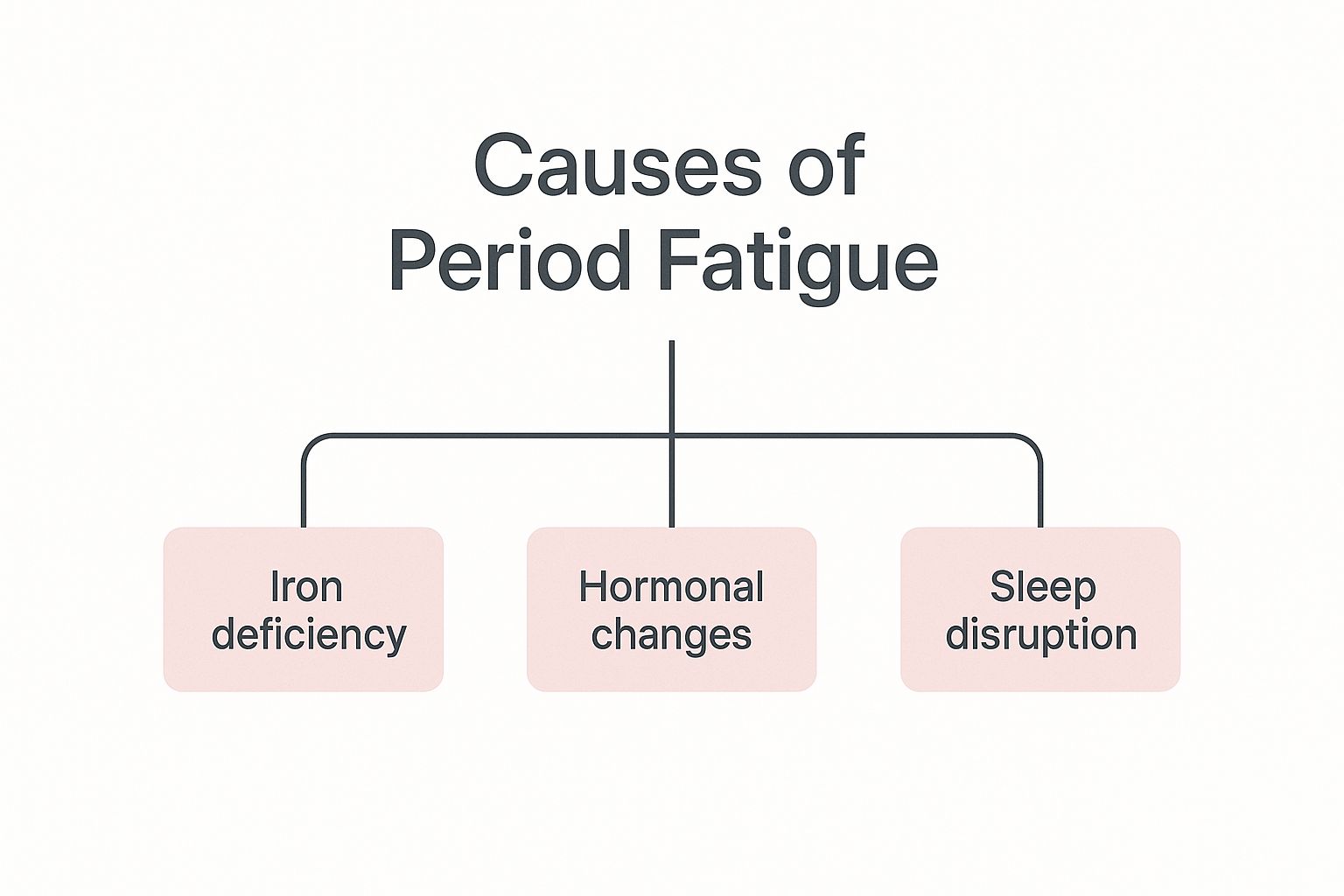
As you can see, it's a perfect storm of hormonal changes, potential iron loss from bleeding, and disrupted sleep that all come together to create that overwhelming tiredness.
The Sleep Sabotage Connection
To top it all off, this hormonal rollercoaster can make it much harder to get a good night's sleep. The drop in progesterone, in particular, can mess with your natural sleep patterns, making it difficult to fall asleep or stay asleep.
Add cramps, bloating, or headaches to the mix, and a restful night can feel pretty much impossible. This lack of quality sleep creates a vicious cycle: you wake up already tired, which makes the fatigue feel even more intense, and the whole thing repeats until your hormones start to level out again.
Beyond Hormones: Other Factors Draining Your Energy
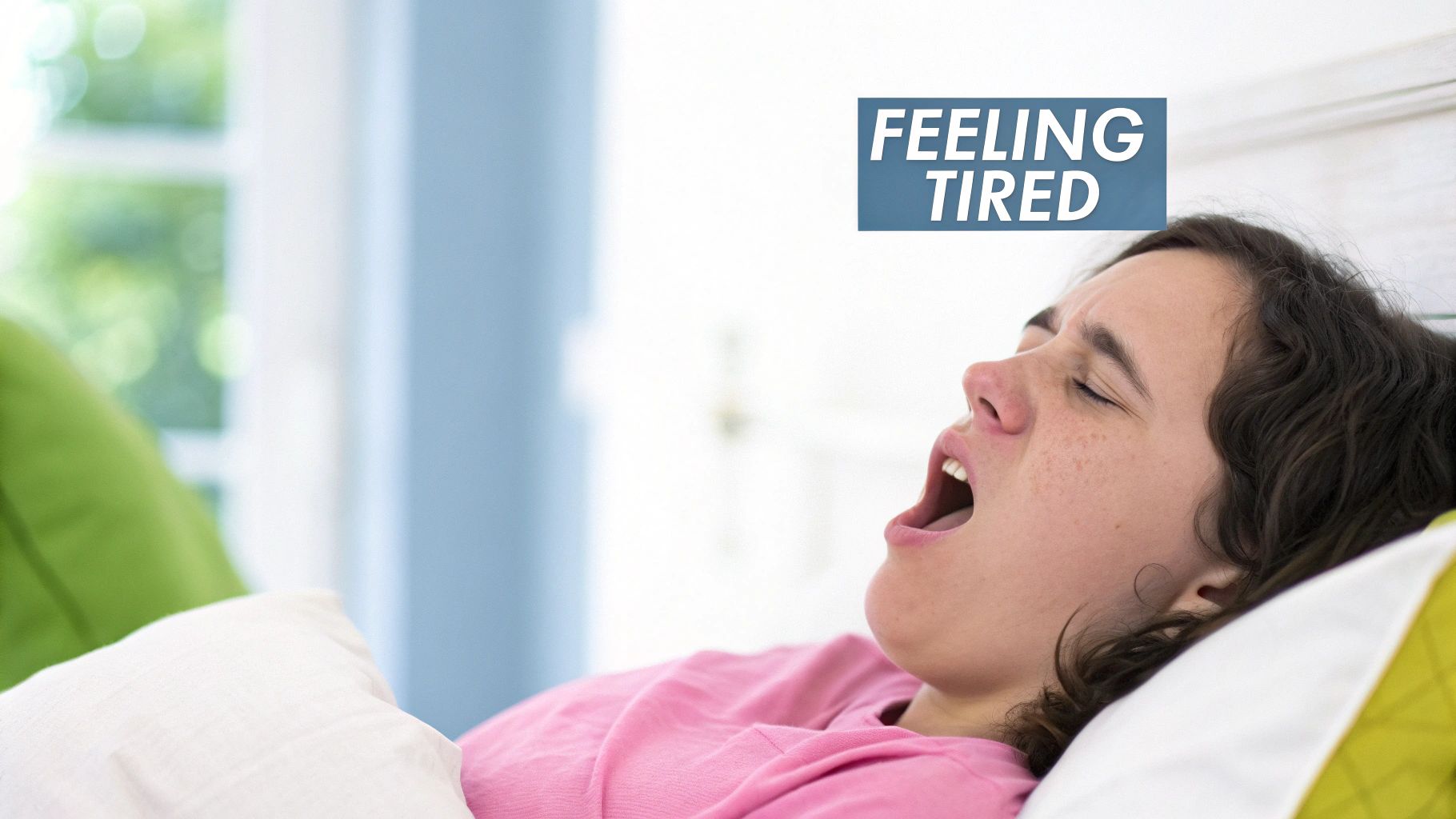
While hormonal shifts are a huge part of the story, they aren't the only reason you might feel completely wiped out. Several other factors can team up to amplify that feeling of exhaustion, turning mild tiredness into that deep, can't-get-off-the-couch fatigue during your period.
Understanding these other players can help you pinpoint exactly what’s draining your battery.
One of the biggest culprits is the blood loss itself, especially if you have a heavy flow (also known as menorrhagia). When you bleed, you lose iron, and iron is absolutely essential for producing haemoglobin.
Think of haemoglobin as the fleet of tiny delivery trucks in your bloodstream, responsible for carrying oxygen to every single cell in your body. When your iron levels dip, you have fewer trucks on the road. This means less oxygen gets where it needs to go, leading directly to physical fatigue, weakness, and even that out-of-breath feeling from just climbing the stairs.
The Sleep Disruption Cycle
Getting a good night's rest can feel like an impossible dream during your period. Persistent cramps, bloating, and that general feeling of discomfort can make it incredibly hard to fall asleep and, more importantly, stay asleep.
This kicks off a frustrating cycle: the physical pain wrecks your sleep, and the exhaustion that follows makes you even more sensitive to pain the next day. It’s a vicious loop.
Even the practical side of managing your flow can get in the way. Waking up in the middle of the night to change a tampon interrupts your deep, restorative sleep stages, leaving you feeling groggy and unrefreshed when your alarm finally goes off.
It's not just about the physical symptoms, either. The mental load of managing your period—worrying about leaks, remembering to pack supplies like digital tampons for your day, and just dealing with the discomfort—is an energy drain all on its own.
Underlying Conditions and Chronic Pain
For some, the fatigue that comes with their period is far more severe, and it can often point to an underlying health issue. Conditions like endometriosis, where tissue similar to the uterine lining grows outside the uterus, can cause chronic inflammation and debilitating pain, leading to an exhaustion that feels bone-deep.
Here in Aotearoa New Zealand, research has shown a strong link between chronic pelvic pain and severe tiredness. A 2022 survey highlighted that over 45% of respondents with chronic pelvic pain also experienced chronic fatigue. That’s a massive number when you compare it to the global fatigue prevalence in women of around 2.83%. You can learn more about the research on pelvic pain in Aotearoa here.
Becoming more aware of your own cycle and symptoms is a powerful first step. If your period fatigue feels overwhelming and gets in the way of your daily life, it might be more than just "normal" period tiredness.
Practical Ways to Reclaim Your Energy
Understanding why you feel so drained is one thing, but knowing how to actually fight back against that exhaustion is where the magic happens. The good news is, you don't need a massive life overhaul. Small, gentle adjustments to your routine can make a world of difference when it comes to managing fatigue during your period.
This isn't about "powering through" or ignoring what your body is telling you. It’s the exact opposite—it's about listening closely and giving your body the support it desperately needs.
Even the thought of exercise might feel completely out of the question when you're that tired, but gentle movement can be surprisingly powerful. A slow walk around the block or some simple, deep stretching can get your blood flowing and release endorphins, which are your body's natural mood-lifters.
We're not talking about a high-intensity workout here. The goal is kind, restorative activity that eases tension and gives your energy levels a gentle nudge in the right direction.
Better Sleep and Stress Management
Disrupted sleep is a massive contributor to period fatigue, so focusing on your sleep hygiene can be a total game-changer. Creating a calming pre-sleep routine is like sending a clear signal to your brain that it's time to wind down.
Simple steps can make a huge impact:
- Set a consistent bedtime: Going to bed and waking up around the same time every day helps regulate your body's internal clock.
- Limit screen time before bed: The blue light from our phones and laptops messes with melatonin production, the key hormone that controls sleep.
- Create a comfy environment: Make sure your room is cool, dark, and quiet. A warm bath or a mug of chamomile tea beforehand can also work wonders.
Alongside sleep, getting a handle on stress is crucial. Your body is already under a lot of physical stress during your period. Piling mental stress on top of that just drains your energy reserves even faster.
Techniques like deep breathing exercises or even just a few minutes of mindfulness can help calm your nervous system right down. This isn't about trying to clear your mind completely—it's just about giving it a moment to pause and reset, which conserves precious energy.
And this isn't just a challenge for everyday life; it impacts people at the absolute peak of their physical fitness. Research on elite female athletes in Aotearoa New Zealand found that fatigue was a major symptom tanking their performance.
Nearly half of the athletes surveyed reported a spike in fatigue linked to their menstrual cycle, and a similar number had been diagnosed with iron deficiency or anaemia—both directly tied to heavy bleeding and exhaustion. You can read more about how the menstrual cycle impacts athletes here. It just goes to show how physically demanding menstruation really is.
How To Eat For Better Energy On Your Period
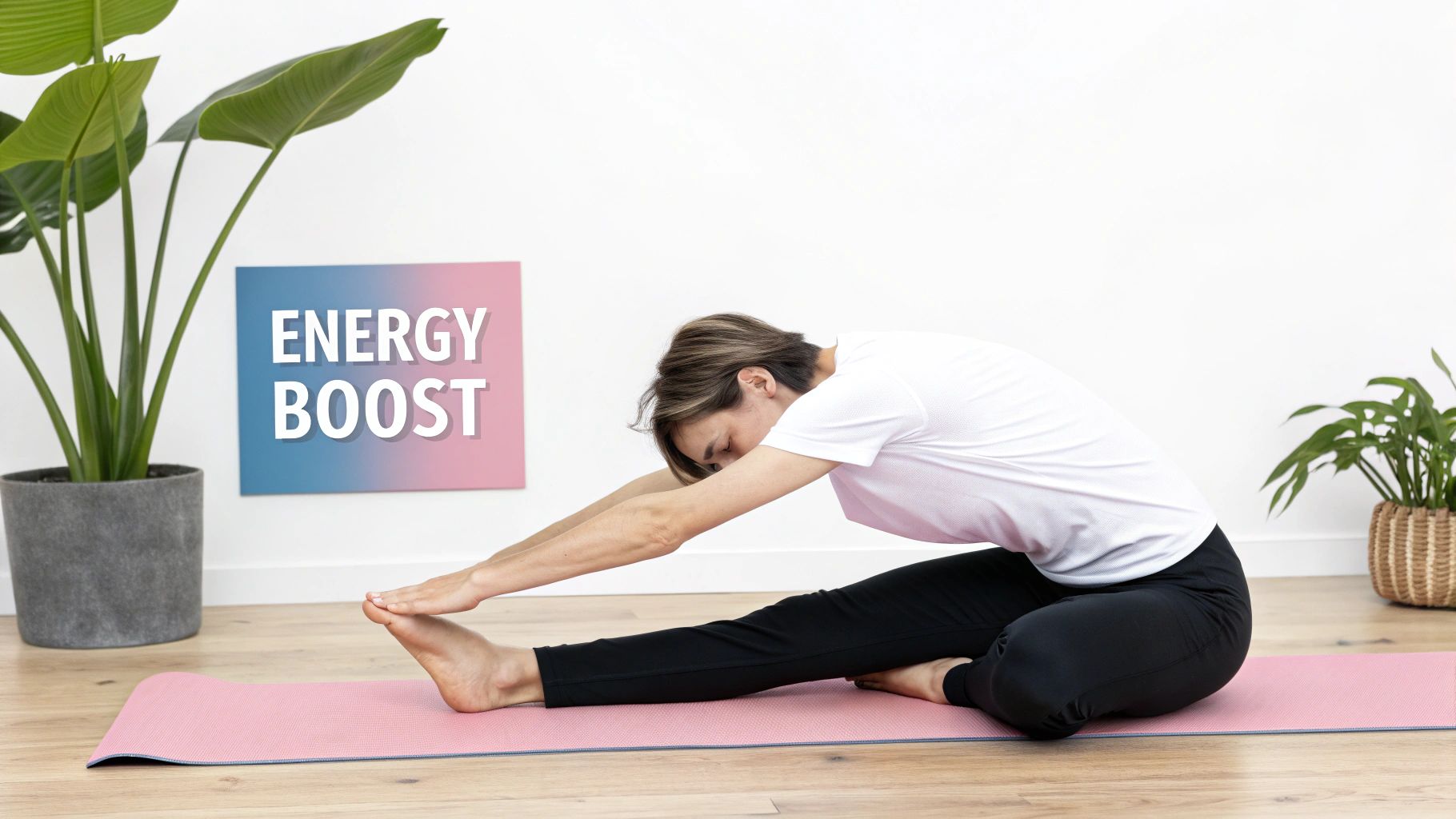
Fuelling your body with the right nutrients can make a massive difference in how you handle fatigue during your period. Think of food as your body’s power source. When your system is already working overtime, giving it high-quality fuel helps it run so much more efficiently.
The choices you make in the kitchen can either steady your energy levels or send them on a wild rollercoaster. By focusing on a few key nutrients, you can build a solid nutritional foundation that helps your body feel more resilient and energised all month long.
Replenish Your Iron and B Vitamins
One of the most important nutrients to zone in on during your period is iron. As you lose blood, your iron stores can take a serious hit. This is a direct cause of that dragging, can’t-get-off-the-sofa feeling, since iron is essential for carrying oxygen to your cells for energy.
Topping up your iron levels is a fantastic way to fight back. You can find iron in two main forms:
- Haem Iron: This is the most easily absorbed type, found in animal products like lean red meat, poultry, and fish.
- Non-Haem Iron: This type comes from plant-based sources like lentils, spinach, tofu, and fortified cereals. To give your body a helping hand absorbing it, pair these foods with a source of Vitamin C—think a good squeeze of lemon over a spinach salad or some sliced capsicum with your tofu scramble.
On top of that, B vitamins are absolute superstars for converting the food you eat into usable energy. Including foods rich in B vitamins, like whole grains, eggs, and leafy greens, can give your energy metabolism a very welcome boost.
It’s not just about what you eat, but how you combine things. Pairing iron-rich lentils with vitamin-C-packed tomatoes, for example, helps your body absorb way more of that vital, energy-boosting iron.
Embrace Magnesium and Complex Carbs
Magnesium is another powerhouse nutrient for period wellness. It plays a role in hundreds of bodily functions, including muscle relaxation and regulating your sleep. Getting enough magnesium can help soothe those crampy muscles and promote a more restful night's sleep—a total game-changer for fighting daytime fatigue.
Great sources of magnesium include:
- Dark chocolate (yes, really!)
- Avocados and nuts
- Seeds, especially pumpkin and chia
- Legumes and whole grains
Finally, let’s talk carbs. It’s tempting to reach for sugary snacks for a quick fix, but that almost always leads to a sharp energy spike followed by an even harder crash.
Instead, opt for complex carbohydrates like brown rice, oats, and quinoa. These release their energy slowly and steadily, helping to keep your blood sugar stable and your energy levels consistent throughout the day. For more ideas, you can check out our guide on foods to help support a healthy menstrual cycle.
Choosing Products for Comfort and Confidence
Feeling comfortable and secure during your period has a massive impact on your energy levels. If you're constantly worried about leaks or fussing with products that don't feel right, it drains your mental battery, piling on top of the physical fatigue during your period.
Choosing the right period care for your unique flow isn't just a practical decision—it's a genuine act of self-care. It helps quiet that background hum of stress, freeing up precious mental space that would otherwise be spent on anxiety.
Finding Your Perfect Fit
The best period product is one you barely notice. It should move with your body, give you reliable protection, and let you get on with your day without a second thought. This is where options like digital (non-applicator) tampons can be a game-changer for many.
Because you insert them with your finger, you get more control over the placement, which often leads to a more comfortable and secure fit. This freedom means you can go for that gentle walk or do some light stretching without discomfort, helping you conserve both physical and mental energy. For anyone looking for a bit of extra support, you can even explore options like a period belt for additional comfort and relief.
Finding a product that truly works for your body gives you peace of mind. That confidence is a powerful tool in combating the mental exhaustion that so often comes with period fatigue.
Period Equity in New Zealand
Feeling comfortable and dignified during your period shouldn't be a luxury. That’s what period equity is all about: making sure everyone has access to safe, affordable, and appropriate menstrual products. It's a crucial conversation here in New Zealand, because a lack of access can cause huge stress and force people to miss school or work.
When you can't get the products you need, it adds a massive layer of anxiety to an already challenging time of the month. The government's free period products in schools initiative is a positive step, but period poverty continues to affect many people, creating barriers to daily life. Thinking about accessible period care as a fundamental part of menstrual wellbeing is key to ensuring everyone can manage their period with confidence.
When to Talk to a Doctor About Period Fatigue
While a bit of tiredness during your period is perfectly normal, the kind of bone-deep exhaustion that completely wipes you out isn't something you just have to accept. Learning to listen to your body is crucial, and knowing when it's time to get a professional opinion is a huge step in taking back control of your wellbeing.
Think of it like this: if your phone battery drained a little faster while running a big update, you’d probably expect it. But if it started shutting down completely after just a few hours of normal use, you’d know something was wrong. Severe fatigue during your period works the same way—it can be a signal that there's an underlying issue that needs a closer look.
Spotting the Red Flags
It's definitely time to book an appointment with your doctor if your period fatigue comes with other, more serious symptoms. These are clear signs that what you're dealing with goes beyond the typical monthly energy slump.
Keep an eye out for these red flags:
- Debilitating Exhaustion: This isn't just feeling tired. It's fatigue so intense it makes it a real struggle to get through your workday, manage daily tasks, or even get out of bed.
- Extremely Heavy Bleeding (Menorrhagia): If you're soaking through a tampon or pad every hour for several hours, or passing clots larger than a ten-cent coin, that's a sign of excessive blood loss.
- Severe Pain: Cramping that doesn't get better with over-the-counter medication and is bad enough to make you cancel plans is not "normal."
- Symptoms That Linger: If your exhaustion, pain, or other symptoms don't ease up once your period ends, it could point to a chronic condition.
How to Prepare for Your Appointment
To get the most out of your doctor's visit, it helps to go in prepared. Simply saying "I'm tired" can be a bit vague for a doctor to work with, but providing specific details gives them the clues they need to help.
Tracking your cycle and symptoms for a month or two beforehand is incredibly helpful. Note down the severity of your fatigue, the heaviness of your flow, and any pain you experience on a simple calendar or in an app.
This kind of information helps your doctor see patterns and advocate for the right tests, like checking your iron levels (ferritin) or looking into other potential causes. You deserve to feel well and have energy, and speaking up is the first step toward getting the answers and support you need.
At Crimson Organic, we believe that period care should support your comfort and confidence, not add to your stress. Our certified organic cotton tampons are designed for reliable protection, helping you feel secure so you can focus on what matters. Explore our range of premium, sustainable period care at https://crimsonorganic.co.nz.
